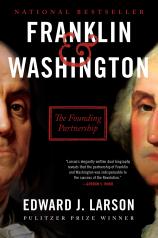Franklin & Washington: The Founding Partnership
Review
Franklin & Washington: The Founding Partnership
With a critical presidential election less than nine months away, millions of Americans are looking for guidance before they cast what might be the most important vote of a lifetime. Perhaps they would be wise to turn their attention from the din of social media to American history for both reassurance and inspiration. A good starting point in their search could be Pulitzer Prize-winning historian Edward J. Larson’s FRANKLIN & WASHINGTON: The Founding Partnership, an impressive joint survey of the lives of “the indispensable authors of American independence and the two key partners in the attempt to craft a more perfect union…”
Aimed at the general reader and, given the accomplishments of both men, eschewing any attempt at comprehensiveness, Larson’s account comprises three acts. The first --- focused on the French and Indian War --- examines the foundation of his subjects’ relationship, one that endured for more than three decades, and their connections in the period before the American Revolution. In the second section, Larson recounts their respective roles --- Washington on the battlefield and Franklin mostly in European diplomacy --- in achieving what must have seemed to both at many moments an improbable victory in the Revolutionary War. Finally, he analyzes their contributions to the drafting and ratification of the Constitution of the new American nation, with particular attention to their divergent views on the issue of slavery.
"While fully reckoning with their shortcomings, Larson is intent on leaving the reader with portraits that reveal both Franklin and Washington as extraordinary leaders."
Emerging a generation apart from two radically different backgrounds --- Franklin the 15th of 17 children of a working-class Boston family, who left home at age 17, eventually landing in Philadelphia where he made his fortune in the printing business, and Washington, the scion of a well-to-do family of Virginia planters --- at first they would seem to share few traits that would allow them to work “shoulder to shoulder on the patriot cause.” Indeed, the two did not meet until 1755, when Franklin was already 49 years old, and Washington was just beginning to emerge as a public figure as a result of his military exploits on America’s western frontier. But as Larson demonstrates, “they shared a republican ideology and progressivist faith that relied on human reason and divine providence rather than traditional ways and established dogmas. They sought truth and accepted facts. Life could get better, they believed. Theirs did.”
Following on the drama of the eight-year-long Revolutionary War --- when Washington masterminded a disorganized and chronically underfunded army to achieve victory over the world’s most imposing military force, while Franklin deployed his considerable skill as a negotiator to secure France’s decisive support for the war effort --- the debates at the Constitutional Convention in 1787, to which Larson devotes a great deal of attention, may seem arid by comparison. Yet it was in those debates that the foundation of an enduring republic was laid, along with the roots of some of the controversies --- notably, the conflicts between large and small states --- that define our politics to this day.
Chief among those controversies was slavery, the issue that Larson argues “shaped the Constitution.” On this issue, the views of Franklin and Washington could not have been more divergent. Washington, the owner of Mount Vernon, was master to some 300 slaves, ones he treated with barely a modicum of kindness. Though the urbanite Franklin at one time owned a handful of house slaves, his views on the issue evolved over his long life, culminating with his assumption of the presidency of the Pennsylvania Abolition Society just before the opening of the Constitutional Convention.
Franklin was nothing if not a pragmatist, and for all his principled opposition to the evil of slavery, he realized that some form of compromise, however odious it might be to him personally, had to be reached if the states had any hope of achieving the unity he had believed, since crafting the Albany Plan of Union in 1754 was essential to the growth of a new nation. Though the Constitution as ratified granted slaves only 60 percent personhood and barred any attempt at abolition before 1808, Franklin persisted in attempts to restrict slavery between the date of ratification and his death in 1790, an effort that “served to confirm his benevolent, philanthropic, and forward-looking nature.”
Larson, who already has produced two books about Washington and another on the Constitutional Convention, is unabashedly sympathetic toward his subjects, though it appears he has a special affection for Franklin, the Renaissance man whose accomplishments in science, literature and philanthropy he touches on only briefly. Washington, he writes, governed “with a granite, tight-lipped self-control that made him the stoic father figure for a nation that adopted Franklin as its favorite uncle.” Despite their differences on substance and in style, theirs was a relationship of mutual admiration and respect, as “each recognized the other’s goodness and greatness.”
While fully reckoning with their shortcomings, Larson is intent on leaving the reader with portraits that reveal both Franklin and Washington as extraordinary leaders. “Despite their flaws,” he writes, “Franklin and Washington have held up better under examination than most leaders of any age. Theirs was the founding partnership that launched a nation.” Facing the far different perils of our own age, is it too much to expect our current leaders, as these two men did, to rise to the challenges the times pose to them?
Reviewed by Harvey Freedenberg on February 14, 2020
Franklin & Washington: The Founding Partnership
- Publication Date: February 2, 2021
- Genres: Biography, History, Nonfiction
- Paperback: 352 pages
- Publisher: Custom House
- ISBN-10: 0062880160
- ISBN-13: 9780062880161




